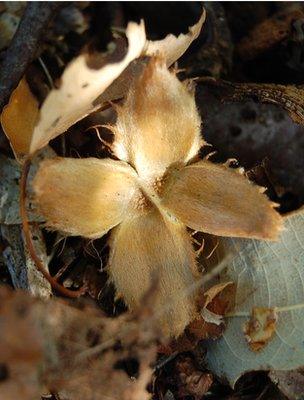Strategy focuses on UK broadleaved trees' future
- Published

Sourcing the most appropriate seeds will help future-proof woodlands, the strategy suggests
An official strategy is due to be unveiled later that aims to protect the UK's broadleaved tree species.
The strategy has been developed by Forest Research, part of the Forestry Commission, and two charities, the Earth Trust and Future Trees Trust.
It will be launched by environment minister Lord De Mauley at an event in Westminster.
It encourages people to choose seeds and saplings carefully to ensure that the trees which they plant do well.
Broadleaved trees are those which have wide leaves rather than the needle-like leaves of conifers. They include ash, beech, birch, elm, holly, hornbeam, lime, oak and poplar.
The document's authors say broadleaved woodlands have declined over the past 200 years, resulting in 95% of hardwood timber now having to be imported.
The 16-page vision, called A Future With Broadleaved Trees, external, says the trees have a "very special place in our national psyche" but are "much more than just beautiful things".
Co-author Dr Steve Lee from Forest Research - the scientific arm of the Forestry Commission - explained: "If they are good quality and grow well, they will lock up carbon for a long period of time. Also, you can make good quality products from the timber, which will last for a very long time.
"The act of planting a tree, and the cost of that tree, is probably going to be the same regardless of where you get it from," he told BBC News.
"So you could plant a maladapted tree, wait a long time and it does not grow very well. Yet you could invest the same amount of money in another tree, which grows very well and remains more resilient to any changes that come along in terms of climate, pests and diseases.
"What we are really saying that the effort is the same, so look around before you plant and think hard about what it is and why it is you are planting those trees."
The strategy, which looks ahead to 2025, is centred around three core objectives:
Improving broadleaved trees through research
Raising awareness of the benefits of using improved broadleaved trees
Encourage planting improved broadleaved trees by establishing a strong policy framework
Earth Trust chief executive Jayne Manley explained: "Our much loved broadleaved trees could provide significant benefits to people and the environment as well as the rural economy.
"We need to focus on these trees rather than take them for granted and part of this is identifying and planting 'improved' trees which are productive, healthy and adaptable."
Dr Lee added: "What you are really after is something that will remain well adapted on that site and will remain resilient to any environmental impacts that may occur over the 80-year or so rotation period.
"The suggestion is that the local material, which you might have planted in the past without really thinking about it, might not be the most resilient in the future."
- Published17 May 2013
- Published20 October 2011
- Published14 September 2011
- Published12 July 2011